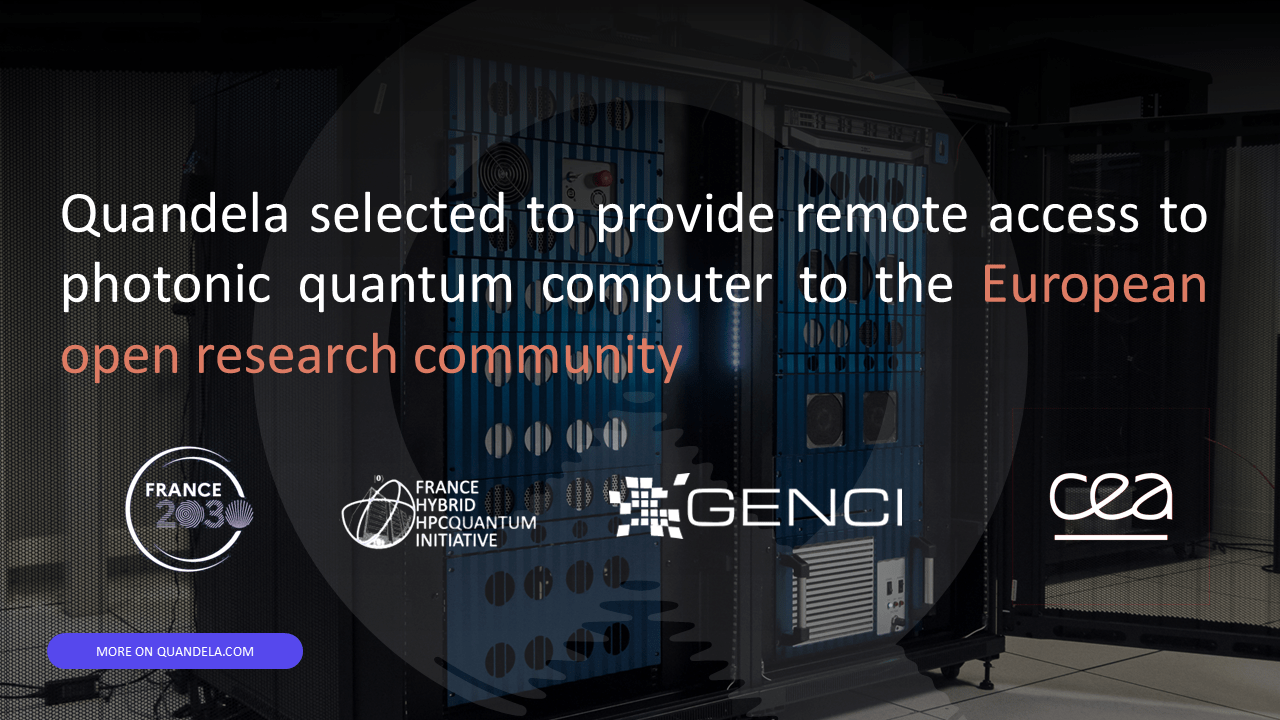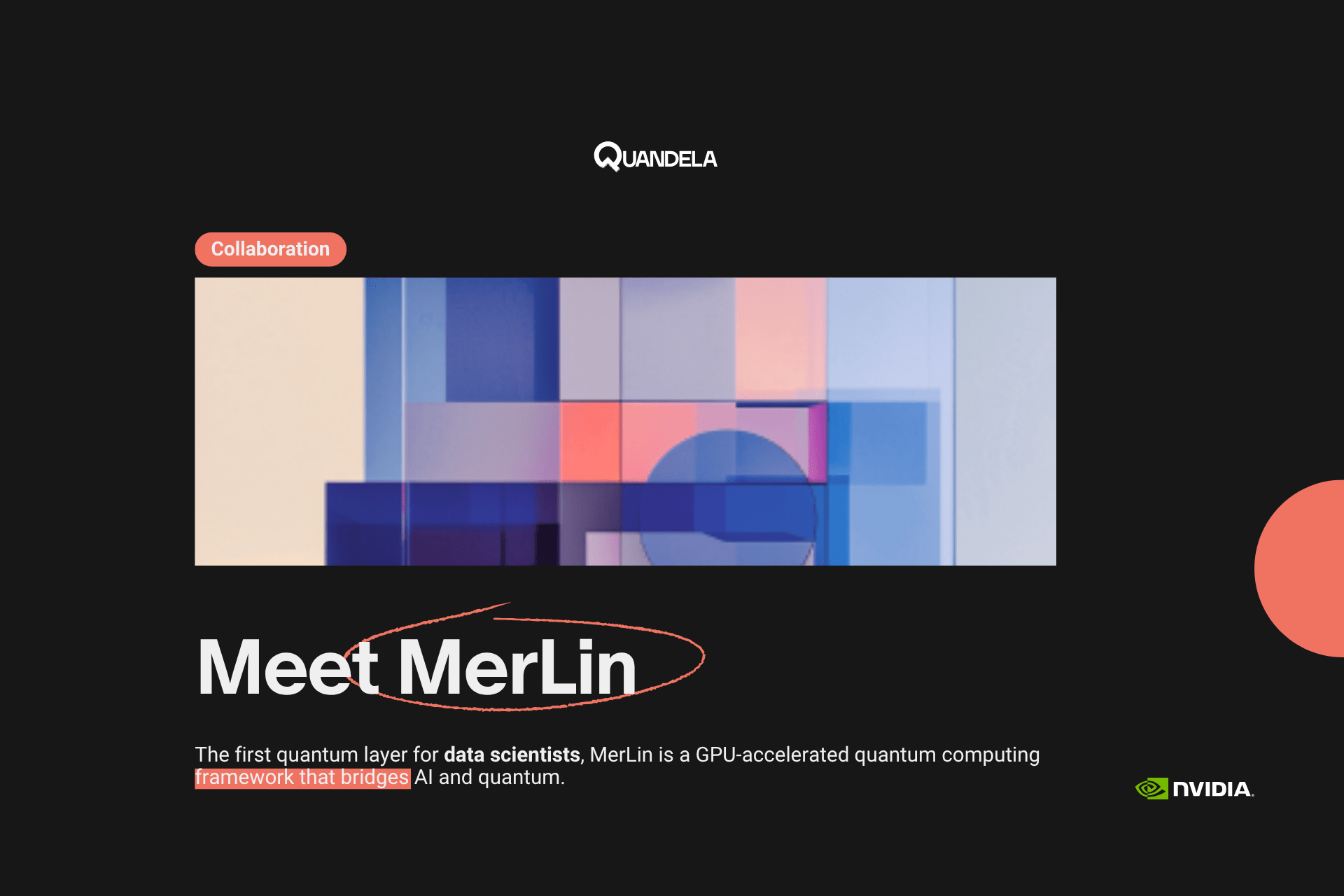Atlanta, Lisbon, 18/11/2024
On the occasion of the SuperComputing 2024 (SC24) conference, held in Atlanta (GA) from November 17th to 22nd, and the European Quantum Technologies Conference, held in Lisbon (Portugal) from November 18th to 20nd, the EuroQCS-France consortium, led by GENCI and CEA and part of EuroHPC’ pan European HPC/QC hybrid infrastructure, announces it will provide early remote access to a Quandela 6-qubit universal digital photonic quantum computer to the European open research community before the Lucy system is installed in France next year.
Anticipating Lucy’s deployment, expected mid-2025
GENCI and CEA, respectively Hosting Entity and Hosting Site of the Lucy EuroHPC’ quantum computer within the EuroQCS-France consortium, had already started exposing tools to help academic and industrial open research communities get acquainted with the specificities of linear optics quantum computing (LOQC). Perceval, the programming and emulation environment provided by Quandela, has been available on the Joliot-Curie supercomputer for over a year. Taking a step further in this approach, the EuroQCS-France consortium will soon provide access to a remote 6-qubit Quandela device until the Lucy system is fully deployed and operational at TGCC, CEA’s computing center. End-users will be able to write their code using Perceval and then to run it on the remote system.
Lucy is the name of the 12-qubit universal digital photonic quantum computer acquired by the EuroHPC Joint Undertaking (JU) to a consortium formed by the French company Quandela and its German partner attocube systems AG. It will be installed mid-2025 at TGCC, CEA’s computing center located in the south of Paris, and coupled with GENCI’s Joliot-Curie supercomputer, just like the Pasqal “Ruby” system acquired in the context of the HPCQS European project. Lucy will be part of an unprecedented constellation of six EuroHPC quantum computers, each one relying on a different hardware technology: scalable superconducting qubits (Euro-Q-Exa, consortium led by LRZ in Germany), star-shaped superconducting qubits (LUMI-Q, IT4Innovation, Czech Republic), trapped ions (EuroQCS-Poland, PSNC, Poland), quantum annealing (EuroQCS-Spain, BSC-CNS, Spain), neutral atoms (EuroQCS-Italy, CINECA, Italy) and single photons (EuroQCS-France, GENCI/CEA, France). So far, four of these systems have been acquired to IQM (Euro-Q-Exa and LUMI-Q), AQT (EuroQCS-Poland), Quandela and attocube systems AG (EuroQCS-France).
Quandela providing expert support to promote research in linear optics quantum computing
On top of this remote preparatory access, end-users will be able to request support from one of Quandela’s experts in LOQC to help them build the applications that will ultimately run on the 12-qubit Lucy system. “Linear optics quantum computing is a very exciting and complex paradigm, with lots of potential use cases. However, we are well aware it also comes with a learning curve and we must make sure users have the right tools and the right level of support to tackle it.”, stated jointly Philippe LAVOCAT, CEO and Chairman of GENCI and Jacques-Charles LAFOUCRIERE, Program Director at CEA and Coordinator of the France Hybrid HPC Quantum Initiative (HQI, which is co-funding Lucy and Ruby).
Niccolo Somaschi, CEO of Quandela stated: “We are eager to expose the Lucy system in the EuroHPC quantum computer galaxy, and in the meantime, very happy to be able to support end-users in their acquisition of the LOQC paradigm.” The access modalities for these services will soon be available on GENCI’s DARI platform.
Any question about these new services and the EuroQCS-France project? Don’t hesitate to come visit CEA’s, EuroHPC Joint Undertaking’s and Quandela’s booths, respectively #4143, #4249 and #4450, at the SC24 conference in the Georgia World Congress Center in Atlanta from November 17th to 22nd.
About
GENCI
Created by the French public authorities in 2007, GENCI (Grand Équipement National de Calcul Intensif) is a major research infrastructure. This public operator aims to democratise the use of digital simulation through high performance computing associated with the use of artificial intelligence, and quantum computing to support French scientific and industrial competitiveness.
GENCI is in charge of three missions:
- To implement the national strategy for the provision of high-performance computing resources, storage, massive data processing associated with Artificial Intelligence technologies and quantum computing, for the benefit of French scientific research, in conjunction with the 3 national computing centres (CEA/TGCC, CNRS/IDRIS, France Universités/CINES).
- Supporting the creation of an integrated ecosystem on a national and European level
- Promoting digital simulation and supercomputing to academic research and industry
GENCI is a civil company 49% owned by the State represented by the Ministry in charge of Higher Education and Research, 20% by the CEA, 20% by the CNRS, 10% by the Universities represented by France Universités and 1% by Inria.
Regarding the national quantum strategy GENCI is partner together with CEA and Inria of HQI, the French HPC hybrid Quantum Initiative.
Follow GENCI on LinkedIn, and visit their website https://www.genci.fr/
Follow HQI on LinkedIn, and visit their website https://www.hqi.fr/
CEA
The CEA is tasked with guiding public decisions and providing the scientific and technical means that civil society (businesses and local authorities) needs to better manage major societal changes, such as the energy transition, digital transformation, future healthcare, defence and global security. Its mission is supported by 20,000 employees and 9 research centres equipped with major research facilities that provide an innovative environment conducive to academic and industrial partnerships in France, Europe and abroad.
Follow CEA on LinkedIn, and visit their website www.cea.fr




